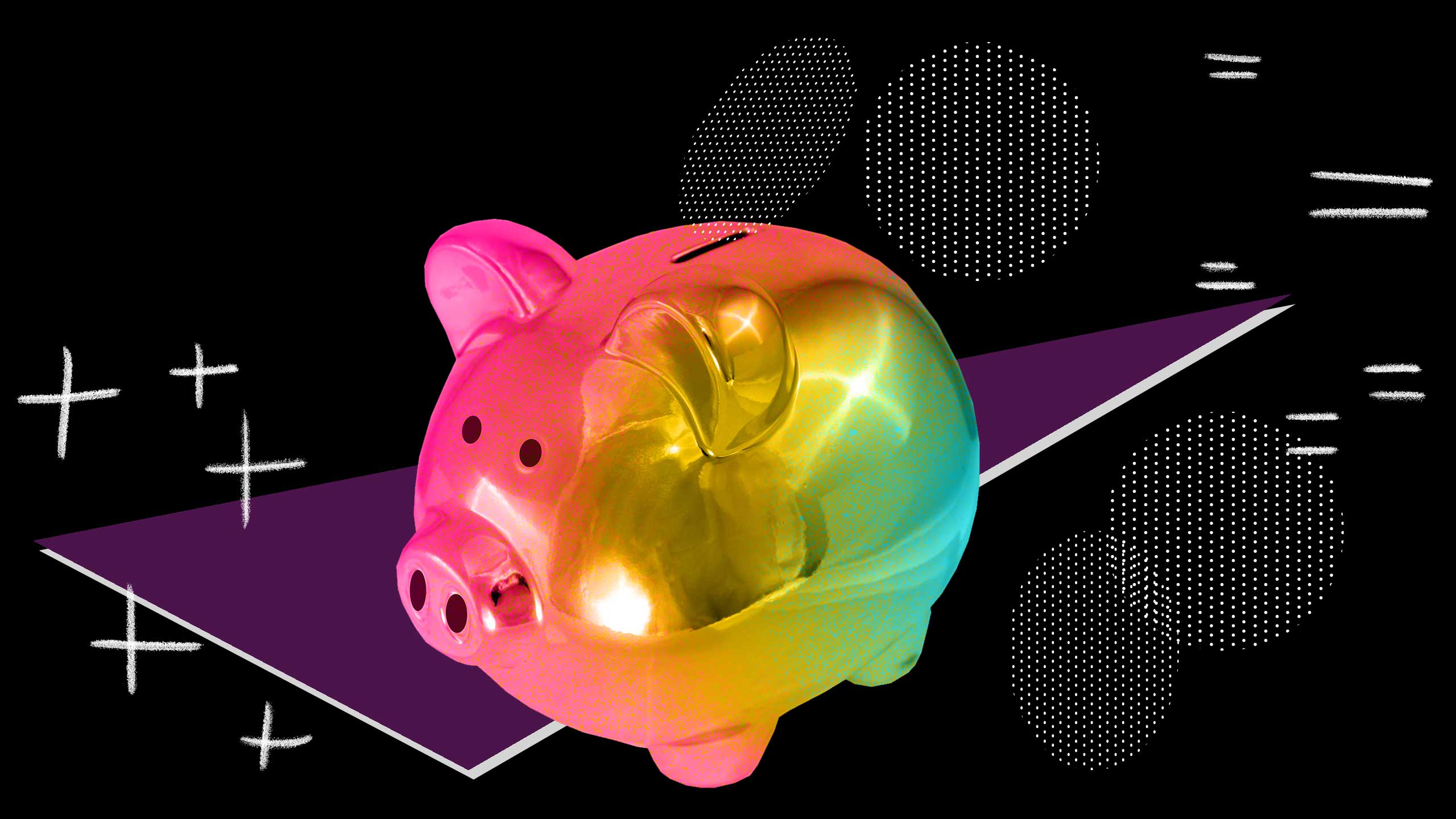For many LGBTQ2S+ people, talking about finances can be uncomfortable at best, intimidating at worst. “Financial stability can be very hard for queer and trans folks, especially when up against financial institutions that won’t recognize their gender, discriminate against them so it’s hard to secure good loans for school, cars and houses, and deadname them in financial records,” says Daniella Flores, founder of I Like to Dabble, an online side hustle and money resource.
Decades of research shows that this type of discrimination can lead to disproportionate levels of poverty within LGBTQS2+ communities. When studying the incomes of trans people in the U.S., the National Transgender Discrimination Survey found that one in four live in extreme poverty, with less than $10,000 in annual household income. That number jumps to 28 percent for Latinx trans people, and 34 percent for Black trans people.
But “money is not the enemy—systematic discrimination and wealth inequality are,” says Hadassah Damien, financial strategist and founder of the Ride Free Fearless Money project.
While capitalism may wreak havoc on the most marginalized in our communities, we still have to live in a capitalistic society. That reality requires us to have some money savvy for mere survival—and when we have enough money that we don’t have to check our accounts on a daily basis, we can thrive.
Talking and teaching about money might not come easily to you—it has been a struggle for me, too. I spoke to Flores, Damien and other queer financial gurus to hear their tips for how queer and trans folks can feel more financially secure in a society that isn’t always set up for our success.
Show yourself some empathy
Damien has coached more than 1,000 people, and she says many of them feel as though their struggles with finances are their own fault, or that their parents didn’t teach them how to correctly manage their money.
But that’s not true. “Money is not an individual failing, it’s a collective failing,” she says. “Almost no one is taught how to think about, use, manage or have money. Allow yourself to learn as you go.”
“It isn’t acceptable how much we have to overcompensate to try to fit into this world, especially financially.”
When you step back and consider how a lack of education might affect your finances, Damien says, you’ll be able to show yourself some empathy in order to move forward and fill those gaps in knowledge.
Flores agrees: “It isn’t your fault nor is it acceptable how much we have to overcompensate day in and day out to try to fit into this world, especially financially,” she says. “There are many factors outside of our control but there are a few that we can control. Once you take that smallest step forward, you’ll grow and learn with each action after that.”
Think about your finances strategically
One of the most important parts of getting a handle on your personal finances and becoming more money savvy is recognizing the bigger picture and how to tackle it in bite-size chunks.
You’ve probably heard gurus talk endlessly about having an “emergency fund” but have never started one because saving enough money to cover six months of expenses is so out of reach that it doesn’t make sense to start. But instead of looking at a big, seemingly unattainable dollar amount, think about it in smaller increments.
“Even setting aside something as small as $20 a month or $10 a week” can add up when putting an emergency fund together, Flores says.
“Having $100 saved, or one month’s rent, makes a difference,” Damien adds.
Thinking strategically also means looking at debt and prioritizing it in a way that will serve your needs. Flores advises not to try to pay all of your debts off immediately if you can’t afford to. Instead, start with the highest interest rate debts first. “If you’re paying the minimum right now and that’s all you can do, that’s fine,” she says.
Get car smart
Cars are the second-largest purchase most people make after real estate; and for folks who rent, it’s often the largest. It’s also a purchase that many people go into without understanding much of what is involved, and without learning how to properly take care of their vehicles.
But lack of know-how isn’t the whole problem. “There’s a general lack of interest in ‘dealing’ with cars, particularly when it comes to maintaining and repairing them,” says Aubrey Shelton, CFO at RepairPal. RepairPal is a queer-friendly automotive company that focuses on helping consumers access the best information on shops and repair cost in an effort to level the playing field. (While some of RepairPal’s features are not available in Canada, its site hosts a wealth of information that is generally beneficial.)
“Purchasing a vehicle is a major financial commitment,” Shelton says. “Do your homework and be sure you understand that the cost of ownership does not stop with simply making your monthly payment.”
Become money savvy about car ownership by doing your research and using resources like Consumer Reports before buying a vehicle. Also ensure you save enough money for car insurance and incidentals—don’t spend all of your savings on the car itself. And when you have a car, get it checked over regularly, follow the maintenance recommended in your owner’s manual and try to prepare in advance as much as possible for its inevitable repairs.
Put your learning cap on
There are plenty of free resources available from leading industry experts who want to help you. “Start learning when you can, where you can, as soon as you can,” says Flores. While not a cure-all it “will help you better navigate this society and the situation you’ve been dealt,” she says.
And the key, Flores adds, is finding personal finance experts that you actually like—especially ones who are part of your community and understand what it’s like to navigate the world as a queer and/or trans person.
The LGBTQ2S+ experts I spoke to for this article each offer incredible educational resources to the community—including Damien’s podcast Bottom Lines Top Dollars, made in conjunction with a Canadian CPA, Flores’ site I Like to Dabble and RepairPal, where Shelton works.
“Start learning when you can, where you can, as soon as you can.”
Flores specifically recommends the resources available through The Trans Capitalist, founded by K. Kenneth Davis, as a resource, in addition to the Queer Money Podcast.
If you prefer to read or listen to an ebook, Damien is a fan of the latest iteration of Your Money or Your Life, a book written more than 25 years ago that remains a game-changer in helping people change their relationship to money.
If you want to better understand car ownership, Mechanic Shop Femme is the platform I created for the queer community; it’s full of content that will help you be a smarter, more savvy driver and car owner.
And once you have that money in the bank? “You can put it towards the things you believe in and slowly change the world around you to be better than it is today,” Flores says.


 Why you can trust Xtra
Why you can trust Xtra


